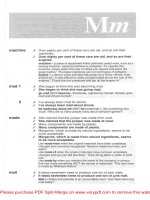Tài liệu TOEFL STUDY GUIDE PART 2 -2 LISTENING COMPREHENSION doc
Bạn đang xem bản rút gọn của tài liệu. Xem và tải ngay bản đầy đủ của tài liệu tại đây (14.11 KB, 7 trang )
TOEFL STUDY GUIDE
PART 2
LISTENING COMPREHENSION
Conversational English Tips 26 - 30
Conversational English Tip 26
Practice speaking and listening to English (radio, TV, internet sites
like Dave's ESL Café ( )
Conversational English Tip 27
Voice emphasis can change the meaning of a statement. In spoken English,
people place stress on certain words in a given sentence to convey
additional meaning beyond the dictionary definitions of the words. The
pitch or volume of one's voice to make the word stand out from the rest of
the sentence. One fo the things that vocal emphasis can tell you is which
information in the sentence the speaker considers to be the most important.
Conversational English Tip 28
Emphasized expressions: What's Important
When the following sentence is written on paper
"Susan took the red purse?"
every word is stressed equally. However, when emphasis is placed on
specific words in the sentence, the intention of the speaker changes slightly.
For example:
"Susan took the red purse?"
If you emphasize "Susan" one is surprised that Susan took the purse, and
not someone else.
"Susan took the red purse?"
If you emphasize "took" one is surprised that Susan "took" the purse and
not perhaps borrowed it.
"Susan took the red purse?"
If you emphasize "red" one is surprised that it was it was not the blue purse
that was taken.
"Susan took the red purse?"
If you emphasize "purse" one is surprised that it was the purse that was
taken, not the wallet for example.
Conversational English Tip 29
Common TOEFL Exam Cliches
All of the following are cliches that appear on the TOEFL and are
used to express simple ideas. We've grouped them by meaning in
order to make them easier to learn.
Meaning: "I don't know."
m I couldn't tell you.
m I wouldn't know.
m I haven't the vaguest.
m I haven't the foggiest.
m I haven't any idea.
m Who knows?
m It's a mystery to me.
m Don't look at me.
m Don't ask me.
m You got me.
m Beats me.
Meaning: "No."
m Not in a million years.
m I wouldn't say that.
m I doubt it.
m Don't count on it.
m Not likely.
m Probably not.
m Don't bet on it.
m I don't think so.
m Dont' be too sure.
m Never.
m No way.
Meaning: "Don't do it!"
m I wouldn't if I were you.
m Oh no you don't!
m Cut it out!
m Not here you don't.
m Better leave well enough alone.
m Forget it!
m Don't bother.
Meaning: Agreement
m To say the least.
m That's putting it mildly.
You can say that again.
That's for sure.
Now, That's an idea.
There you go! -- Now youve said something I agree with,
whereas you didn't before.
I'll say.
I couldn't agree with you more.
Count me in.
Why not!
Won't I!
Don't I!
Aren't I!
Meaning: "Thank you!"
Thanks!
I appreciate it.
Thanks a lot.
I don't know how to thank you.
You're a lifesaver.
I'll never be able to repay you.
I 'm grateful.
Meaning: "You're welcome!"









